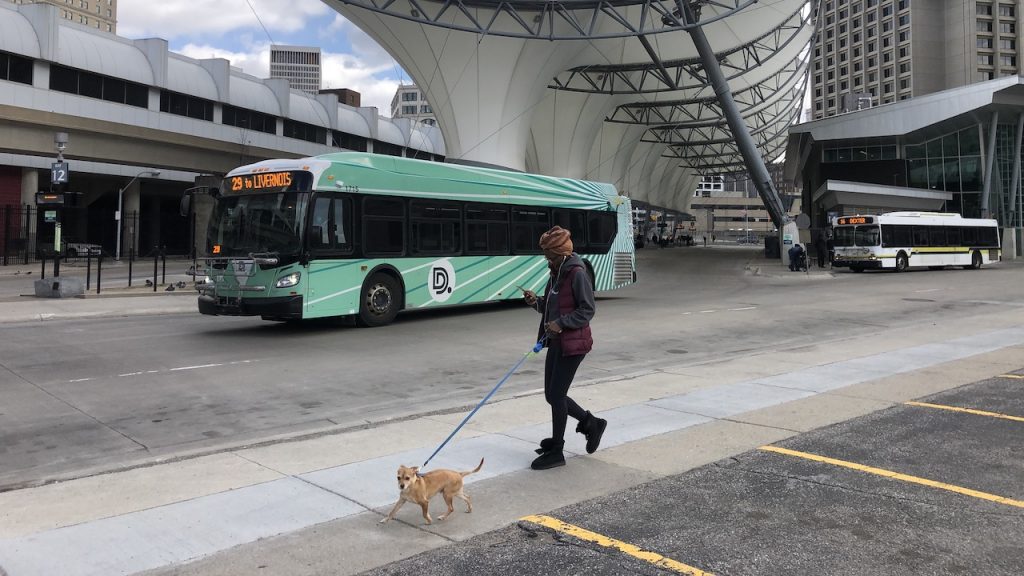Detroit Bus Drivers To Get New Contract, Which Establishes $15 Hourly Base Pay
The agreement, which follows concerns stemming from the coronavirus, also calls for a 10% wage increase over four years.

Transit among other issues will be top priorities for Detroit's next mayor. Photo credit: Eli Newman, WDET
After three years of negotiations, the bus union and the city have reached a deal on a new contract for drivers.
The four-year agreement establishes a $15 an hour base pay, an increase from $12.99 an hour, with a 10% wage increase over four years. According to the tentative deal, drivers will also receive a one-time bonus of $1,000.
“The safety of the operators is our number one goal, to make sure that we have the barriers in place and to make sure we have all of the protocols in place as we move forward to collect fares.” –Mikel Ogelsby, Detroit’s Director of Transit
The union is still discussing hazard pay for those who worked during the coronavirus pandemic, says Glenn Tolbert, President of the Amalgamated Transit Union Local 26.
“We’re going to be steady working and we’re going to be steady talking about it until [the pandemic is under control], every time I wake up it seems there’s a new variant. I don’t think we’re out of the woods,” he says.
Mikel Ogelsby is Detroit’s Director of Transit. He says he’s glad to move past the contract discussions.
“The pay is where it needs to be. The safety of the operators is our number one goal, to make sure that we have the barriers in place and to make sure we have all of the protocols in place as we move forward to collect fares. And we’re going to monitor this and we’re going to monitor it together as a team,” he says.
The contract establishes a new policy for bus drivers to monitor absences. DDOT will resume collecting bus fare on March 15.
Mayor Mike Duggan says he’s glad the three-year negotiation has come to an end.
“The tension that has existed between DDOT management and the union is something I have not been very happy about,” he says.
Tolbert says the discussions with the city will continue as buses reopen their fare boxes.
“It does bring a new danger, so we’ll be looking into that,” he says.
A Rocky Year for Bus Drivers
Bus drivers went on strike at the onset of the pandemic — and again last fall — calling for increased safety measures to protect themselves from the COVID-19 pandemic and general threats of violence by passengers.
The tension boiled over when a bus driver and passenger got into a physical altercation over a mask-related dispute. DDOT suspended the operator, leading to a three-day strike in the fall that left thousands of passengers without transportation.
Local ATU officials are holding a meeting with DDOT bus drivers to discuss some of the preliminary terms they’ve reached with the city. I’ve been asked to wait outside the gymnasium where they’re meeting. pic.twitter.com/A2qKadlLkb
— Eli Newman (@other_eli) October 4, 2020
Coach operators have long complained about violent threats and altercations with passengers, and the pandemic has underscored bus drivers’ safety concerns.
“It was happening before COVID, it’s just become tenfold now because no one wants to wear a mask,” Tolbert said last fall.
To address some of complaints and concerns, DDOT and the union agreed to a series of safety precautions such as the installation of permanent barriers between passengers and operators before the end of the year, face masks for passengers and investigation of instances of alleged self-defense used by bus drivers before offering discipline, according to an agreement between the city and bus driver’s union to end the work stoppage.
Trusted, accurate, up-to-date
WDET is here to keep you informed on essential information, news and resources related to COVID-19.
This is a stressful, insecure time for many. So it’s more important than ever for you, our listeners and readers, who are able to donate to keep supporting WDET’s mission. Please make a gift today.
